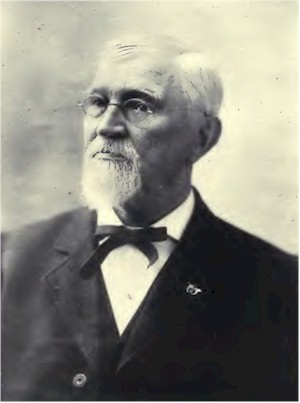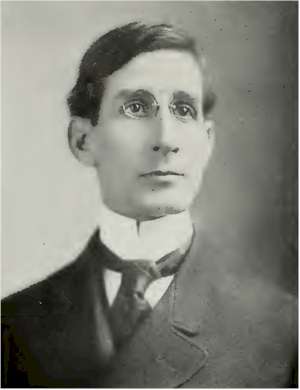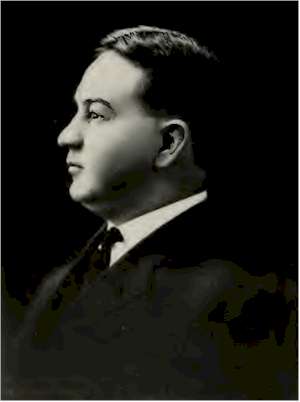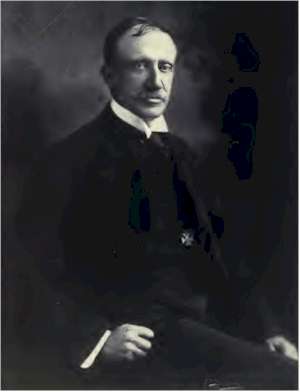Utah Biographies ~ Park to Powers

Park, Boyd
Boyd Park is one of the most prominent jewelers in the United
States, and his establishments in Salt Lake City and Denver,
Colorado, are second to none in the jewelry trade. Mr. Park is a
native of Scotland, and was born at Ellerslee, December 28,
1837, being at the present writing nearly seventy-two years of
age and still actively engaged with the business founded by him
nearly forty years ago. He is a son of Alexander Park, who
conducted a silk weaving establishment at Ellerslee, Scotland,
and Margaret Stephenson Park.
Mr. Park received his education in the schools at Bridge of
Weir, Scotland, and his first occupation was working in the silk
mills of his native place. In May, 1849, while still a boy, he
arrived in New York City, and began the career which was
destined to make him a successful man. Shortly after his arrival
in this country he went to Troy, New York, where he learned the
jeweler's trade thoroughly, with the firm of William L. Adams.
Starting as an apprentice in 1852, he worked his way to the top.
He remained there until 1862, when he removed to Poultney,
Vermont, and became associated with Jervis Joslin, remain-ing
there until the spring of 1866, when he went to Denver,
Colorado, and in May of that year he established the first
Western store of the well-known firm of Joslin & Park. In
December, 1867, he extended his business, and opened a store in
Cheyenne, Wyoming, and he conducted that place while his
partner, Mr. Joslin, established a like concern in Leadville,
Colorado, under the firm name of Joslin & Park. In 1871 the Salt
Lake establishment was opened under the same firm name, which
remained until the death of Mr. Joslin, when Mr. Park purchased
from his estate his interest in all of the stores, and has since
continued the business, doing a manufacturing and retail
business of great magnitude. The manufacturing department is one
of the best equipped and does the largest volume of business of
any house west of Chicago.
Mr. Park is one of the best known and most respected citizens of
the inter-mountain country, and is always foremost in any
movement for the public good and welfare of Salt Lake City. He
was a member of the Library Board for several years, was
president of the Bank of Commerce for a number of years, and has
been, and is now, actively identified with many of Salt Lake
City's largest industries.
Mr. Park was married in January, 1869, to Miss Jennie Culver, of
an old American family dating back to Revolutionary times, and
to them were born two children: Samuel C. and Margaret B. Park.
Mr. Park is a member of the Alta and Commercial clubs, and of
the Masonic fraternity, being a Knight Templar and a Mystic
Shriner.

Pollock, James A.
Probably one of the most successful
business men in Salt Lake City today, and one who is respected
and admired by all on account of his scrupulously honest methods
and fair dealing is James A. Pollock, president of the Salt Lake
Stock and Mining Exchange and also of James A. Pollock &
Company, bankers and brokers. That this latter business is the
largest in the inter-mountain region is proof positive of the
wonderful keenness and aggressiveness of the man.
Born in Pike County, Missouri, forty-one years ago, he was
educated in St. Louis. He remained in that city until 1889, when
he went to Denver, and in the following year came to Salt Lake,
where he has been ever since. At the time that he came here the
Salt Lake Stock and Mining Exchange had just started, and Mr.
Pollock was made secretary. The opportunity for a bank and
brokerage firm appealed to Mr. Pollock, and within a year after
his arrival here he established his business. At the time of the
establishment of the company there were very few Utah stocks
which were known outside the State, but with the foresight that
characterized all of his acts, he set to work to make Utah
stocks known all over the country. In this he has been eminently
successful and those in a position to know state authoritatively
that Mr. Pollock has done more than any other one man in placing
before the Eastern investing public the many excellent
propositions within the boundaries of this State.
His place of business on West Second South Street is always a
scene of great activity. Realizing the possibilities of the city
and State and the necessity for things modern and up to date,
Mr. Pollock, in 1903, established the first private wire system
in the inter-mountain country, and today there is not an
important financial center in the country with which he is not
connected. Always alert and eager to boost the city of which he
is so proud, Mr. Pollock has by his efforts brought more
millions into the State than any other one man.
Mr. Pollock does not bother in politics, but is an ardent worker
for anything that is for the building up of the city. The only
office which he holds is the presidency of the Salt Lake Stock
and Mining Exchange. He has held that office for many years and
the members of the Exchange do not seem disposed to let him
retire, as he is recognized as an authority on all Western
securities.
Socially Mr. Pollock is well known and belongs to many clubs,
both here and in California. He is a member of the Alta, Country
Club, and also of the Country clubs of Pasadena and Santa
Barbara, California, at which places he spends a portion of each
year.
Although a young man, Mr. Pollock has been uniformly successful
in all of his ventures, and he is today one of the prosperous
men of Salt Lake. He has a legion of friends and they predict
for Mr. Pollock a future full of successes.

Porter, Sam S.
In Sam S. Porter, manager of the Kenyon
Hotel, Salt Lake City has an example of that younger set of
business men which plays such an important part in industry, and
particularly in Western industry; for it is often a matter of
remark that much of the success of the West is due to the fact
that young men are at the head of its important institutions.
Mr. Porter is a native of Chicago, where he was born in 1876.
His father is Don H. Porter, proprietor of the Kenyon Hotel, a
man of strictly business affairs, who is of a benevolent
disposition, and a man widely known, particularly as "mine host
of the Kenyon," and Sam has been raised "to the manor born" and
drilled on the lines that the hotel business does not entirely
mean a mere livelihood, but to know it well and to make it
justly and liberally a profession and an art.
The Porters came to Salt Lake City about 1892 or 1893, and their
son received his education in the Salt Lake City public and high
schools and at the University of Utah.
Of an active disposition, and possessed of a good physique, Mr.
Sam Porter at college was interested in athletics, and won early
distinction for himself as a member of the All Hallows College
and University football teams. Later he played with the Y. M. C.
A. team. He also joined the National Guard of Utah, and was
captain in that body for four years. When the Spanish-American
War broke out, Mr. Porter was quick to answer the call of his
country, and he served as quartermaster sergeant in the first
Utah Volunteer Cavalry, Troop A.
In the business world, Mr. Porter got his start as a clerk with
the Rocky Mountain Bell Telephone Company, leaving that to go to
the war. Returning, he joined forces with his father in the
Kenyon Hotel, and as manager of that hostelry he is well known
to the traveling public from every part of the Union. The energy
he has shown, and the popularity he has attained in his present
position, presage for him a future full of success and promise.
Mr. Porter's activities have by no means been confined to the
hotel field. True to a trait that is characteristic of the
Western business man, he has branched out along many lines.
Among the more important positions he holds with other
enterprises are those of member of the Executive Committee of
the Pittsburg-Salt Lake Oil Company, secretary and treasurer of
the Rexall Silver and Copper Mining Company, and vice-president
of the Wasatch Electric Company.
And not only in the business field have Mr. Porter's qualities
won for him both popularity and success. From his college days
to the present he has been a leader in the social sets in which
he has moved. He is a well-known and popular member of the
Country Club, and in the Commercial Club his business acumen and
energy have long been recognized.
Mr. Porter was married to a Chicago girl, Miss Amy F. Bersbach,
and they have two baby daughters, Helen May Porter and Lilian
Claire Porter. His pretty residence, in the fashionable quarter
of the city, East South Temple Street, has been the scene of
many an enjoyable and select social function.

Powers, O. W.
Judge O. W. Powers, one of the most
prominent jurists of Utah, was born June 16th, 1850, at
Pultneyville, Wayne County, New York, near Palmyra. His
ancestors occupy honorable places in the history of England and
Ireland, and many of them appear conspicuously in Colonial and
Revolutionary times.
In the place of his birth he passed his early boyhood with his
parents, who were farmers. He secured his early education at a
district school and at Sodus Academy and the Marion Collegiate
Institute of Wayne County.
Determining to become a lawyer, Mr. Powers procured a copy of
the Revised Statutes of New York, which he studied very
sedulously. At the age of eighteen he was given his choice of
taking a course at Cornell University or the University of
Michigan. He chose the latter, and graduated in 1871.
After his graduation Mr. Powers returned home and worked on the
farm for a time, in order to obtain the means with which to
begin the practice of law.
In 1873 he removed to Kalamazoo, Michigan, landing there with
less than one hundred dollars, and with no experience either at
the bar or in a law office. He succeeded in obtain-ing a
position as clerk with the law firm of May & Buck, and received
for his services his board and permission to sleep in a room
back of the office. After three months they allowed him a salary
of ten dollars per month in addition to his board and lodging,
requiring him, however, to put into the firm five hundred
dollars worth of law books, which he procured by borrowing the
money.
He advanced rapidly in his profession and was soon ably handling
important cases. In the midst of his law practice, he found time
for some political work. In 1874 he took the stump for the
Democratic Party, and was thereafter a member of every
Democratic State Convention of the State of Michigan, and for
many years held the position of County Chairman for the
Democrats of Kalamazoo County, directing his party in several
hard-fought campaigns.
In 1875, Mr. Powers succeeded to the business of May & Buck and
associated himself with Mr. W. H. Daniels. In 1876, he was
elected City Attorney of Kalamazoo. In the presidential campaign
of that year, he stumped the State for Samuel J. Tilden. He also
took part in the campaign in Indiana, speaking through the
northern part with Governor Hendricks and Daniel W. Voorhees. A
strong friendship grew up between Judge Powers and Governor
Hendricks and thereafter the former was a staunch supporter of
the great Indiana statesman.
In 1880, without his consent, Judge Powers was unanimously
nominated for Congress from the Fourth District of Michigan,
which had been almost uniformly represented by a Republican. He
was defeated by Julius Caesar Burrows, now United States
Senator.
In 1882, Mr. Powers wrote "Chancery, Practice and Pleading," and
in 1884 he wrote "Powers' Practice," both of which are
recognized authorities.
In 1884 he was elected to the Democratic State Convention and
was also, the same year, one of the four delegates at large from
Michigan to the Democratic National Convention at Chicago.
In 1885, he was again elected City Attorney of Kalamazoo, and
during the same year he was appointed, by President Cleveland,
Associate Justice of the Third District of Utah, and in May of
that year he took the oath of office and entered upon his
duties, with head-quarters at Ogden.
On August 16th, 1886, Judge Powers ceased his duties on the
bench, and was succeeded by Judge H. P. Henderson, of Michigan.
He then returned to Michigan, where he became editor of the
"Daily Democrat" at Grand Rapids.
On October 26th, 1887, Judge Powers was married to Miss Anna
Whipple, daughter of George Whipple, an old resident and
merchant of Burlington, Iowa. They had two children, Don Whipple
Powers, who died in 1889, and the other, Roger Woodworth Powers.
In 1887 Judge Powers returned to Utah and began the practice of
his profession in Salt Lake City, where he has built up a large
and lucrative business.
In 1888, the Liberal Party, which had been growing very strong,
selected Judge Powers for its leader. He was made chairman of
the Liberal Territorial- Committee, and conducted a vigorous
campaign throughout Utah. In 1889, he was called upon to take
the chairman-ship of the Liberal Party of Salt Lake City. He
accepted and laid out the work for the hottest political
campaign ever fought in Utah. The election resulted in a victory
for the Liberals, for the first time in the history of the
State, by a majority of 841 votes.
Judge Powers remained the leader of the Liberal Party until its
dissolution, in 1892.
In January, 1897, Judge Powers was a candidate for the United
States Senate, but before the balloting he withdrew in favor of
Hon. Moses Thatcher. The latter was, however, defeated by Hon.
Joseph Rawlins.
In 1898, Mr. Powers again became a candidate for United States
Senator and was one of the leading candidates during the whole
session of the legislature, which failed to elect a Senator.
On August 26th, 1899, an attempt was made by an ex-convict,
named John Y. Smith to assassinate Judge Powers by means of an
infernal machine loaded with giant powder and fulminating caps.
The would-be assassin was captured, and the day after his
conviction he committed suicide.
In 1900, Mr. Powers was appointed United States Senator by
acting Governor Nebeker, but he declined the appointment. The
same year he was Democratic nominee for Presidential elector. In
1904, and again in 1906, he was the unanimous choice of his
party for Congress. In 1908 he was a delegate to the Democratic
National Convention, where, in a strong and eloquent speech, he
seconded the nomination of William J. Bryan for President of the
United States.
Judge Powers is the head of one of the leading law firms of Utah
and is employed in cases of the greatest importance. His
practice is very large, extending over Utah, Wyoming, Idaho,
Nevada, Colorado, Washington and California; and comprising all
branches of the law. As an advocate, he has few equals and
probably no superiors; as an orator, he is forceful and
brilliant. His late case at Washington, D. C., in which he
secured the acquittal of Mrs. Anna M. Bradley, charged with the
murder of Ex-Senator Arthur Brown, which case is still fresh in
the minds of the people of the United States, is one of his most
notable achievements.

Index

Source: Sketches of the Inter-Mountain
States, Utah, Idaho and Nevada, Published by The Salt Lake
Tribune, Salt Lake City, Utah, 1909
|

